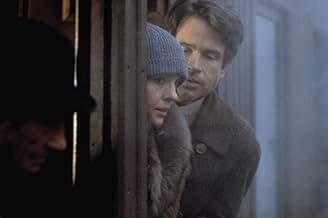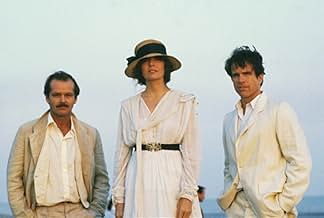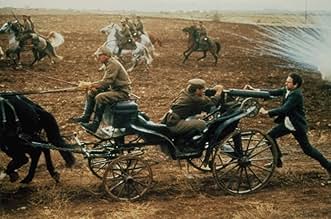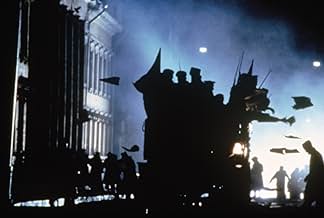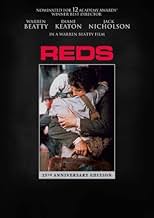Ein radikaler amerikanischer Journalist kommt mit der kommunistischen Revolution in Russland in Berührung und hofft, ihren Geist und Idealismus in die Vereinigten Staaten bringen zu können.Ein radikaler amerikanischer Journalist kommt mit der kommunistischen Revolution in Russland in Berührung und hofft, ihren Geist und Idealismus in die Vereinigten Staaten bringen zu können.Ein radikaler amerikanischer Journalist kommt mit der kommunistischen Revolution in Russland in Berührung und hofft, ihren Geist und Idealismus in die Vereinigten Staaten bringen zu können.
- Regie
- Drehbuch
- Hauptbesetzung
- 3 Oscars gewonnen
- 22 Gewinne & 37 Nominierungen insgesamt
- Mrs. Reed
- (as Eleanor D. Wilson)
Empfohlene Bewertungen
Technically, the movie is beautiful to look at, well written and well acted. It has a lot of great professional actors in it, and lots of the people who were actually there at the time this part of our history was being made. The "witnesses" device works well for Warren Beatty who as a director and writer always seems to include the easily overlooked details of the stories in most of his films. He is also at his fumbling best as John Reed, whose 10 Days That Shook The World fell into well-deserved obscurity probably almost as soon as it was written. That this great historical perspective could rise out of that is truly a testimony to Beatty's talent.
There are many great acting performances in this film, including one of Jack Nicholson's very best as Eugene O'Neil, as well as those of Paul Sorvino, Gene Hackman and George Plimpton who demonstrate the range of persons who touched Jack Reed's life. Jerzy Kozinsky is riveting as Zinoviev.
If one likes historically based dramas, this one should leave you breathless, and will probably leave you wanting to watch it more than once, just to make sure you don't miss any of the details.
10 Stars, Absolutely.
I am old enough to have lived through (probably) three different Americas. These are radically different worlds. It isn't just the mood, styles or state of the economy; its the adoption of a whole cosmology. Religions change under our feet. Family, love, belonging. These things are malleable yet largely beyond our control and we forget what "things were like." Memory always is constructed in terms of the present world.
Always.
So projects like this are necessary. We cannot know who we are unless we remind ourselves who we were.
The ordinary fold here is a romance, folded into grand political actions. Here they are a bit more cerebral than usual, but never getting past the notion of simple justice.
The more unusual and complex fold is that we see a story based on real events and people. Interspersed with that story are interviews of people who were personally involved in the story. These are remarkable, the way they are captured and the way they are edited to overlap with and annotate the story. But much more engaging is that these are enticing people, many with minds and phases that invite us into their faces made warmer and more open by Beatty's camera. I compare this to the "Up" serious and the contrast is astonishing. True, here we want to be informed about the lives of others, and the "Up" goals pretend that the people randomly selected decades ago are remotely worth knowing.
But these folks are. We want more, simply based on their implicit invitation, and we carry ourselves into the narrative more forcefully, sort of like the characters do. This is folding doing its job and doing it well. They remember. I remember, and therefore am.
Ted's Evaluation -- 3 of 3: Worth watching.
So this is basically the story of John Reed and Louise Bryant, two left-wing writers and activists whose affair and marriage only lasted five years, ending with his death in Russia in 1920, but covering some incredibly important American and world history. Bryant first meets Reed when he speaks at the Liberal Club in Portland, Oregon. She's pretentious - denying that she's married or even believes in marriage - as she and Reed have an all-night discussion of writing and politics - and nothing else - at her studio around the corner. When they encounter each other by chance some days later, surrounded by people who know them both, the truth comes out in an extended meet cute encounter that Bryant is married to a dentist and living a bourgeoisie lifestyle. But she is dissatisfied and wants more.
At Reed's invitation, Bryant follows Reed back to New York City and moves into his apartment. But at first she isn't respected when she's cross examined by Reed's highbrow circle of radical friends, asked what she does, and she says she writes about "everything". The couple fights, makes up, engages in socialist politics and activism, and are separated for long periods of time, usually because Reed is galivanting about the country writing about this or that. Ultimately, the Czar is overthrown in Russia and the pair go there when it looks like the Bolsheviks will overthrow the provisional government instituted after the downfall of the Czar.
It's downhill from there for our socialist couple, because it is at this point they encounter the tired but true old saying that absolute power corrupts absolutely. Back in the United States, energized by what has happened in Russia, the Socialist Party fractures into a conventional and Communist wing, and then the Communist wing fractures yet again, largely over the issue of control. When Reed returns to Russia after the Communists have had a chance to consolidate power, he finds them to have become dogmatic and are censoring what he is allowed to say when speaking to crowds. He dies young and disillusioned in a Russian hospital.
Technically this was for sure a great accomplishment. It does a good job of drawing you into the time and place it is set. I felt like I was experiencing these important events myself rather than just watching them be recreated onscreen. The witnesses add some context, although I wish I knew more about them. I remember at the time wondering when these conversations were recorded, because in 1981 they would have had to be over 90 to have known either Reed or Bryant. The love story is convincing although the couple spends long periods of time apart.
I'd recommend it, but realize it is not for the faint of heart or those short in attention span.
Wusstest du schon
- WissenswertesReportedly, Warren Beatty reshot some scenes up to 35 times. Paul Sorvino said he did as many as 70 takes for one scene, and Maureen Stapleton said she did as many as 80 takes for another. Reportedly, of this, she famously once said to Warren Beatty, "Are you out of your fucking mind?" This earned her a round of applause from the crew.
- PatzerThe Finnish doctor tells Reed that his blood pressure is too high, but at that time, hypertension was not considered a problem by most doctors, who did not even consider treating it. Not until the mid-'40s did doctors begin to understand the dangers of high blood pressure.
- Zitate
Eugene O'Neill: If you were mine, I wouldn't share you with anybody or anything. It'd be just you and me. We'd be the center of it all. I know it would feel a lot more like love than being left alone with your work.
- Crazy CreditsAs the credits roll, additional interviews with the 'witnesses' play.
- Alternative VersionenThree seconds of horse falls were cut from the British version. The DVD supplements showing these shots are also cut in England.
- VerbindungenFeatured in Sneak Previews: Rollover, Quartet, My Dinner with Andre, Reds (1981)
- SoundtracksYou're a Grand Old Flag
Written by George M. Cohan
Top-Auswahl
Details
- Erscheinungsdatum
- Herkunftsland
- Sprachen
- Auch bekannt als
- Reds
- Drehorte
- Senate Square, Helsinki, Finnland(on location)
- Produktionsfirmen
- Weitere beteiligte Unternehmen bei IMDbPro anzeigen
Box Office
- Budget
- 32.000.000 $ (geschätzt)
- Bruttoertrag in den USA und Kanada
- 40.382.659 $
- Eröffnungswochenende in den USA und in Kanada
- 2.325.029 $
- 6. Dez. 1981
- Weltweiter Bruttoertrag
- 40.382.788 $


